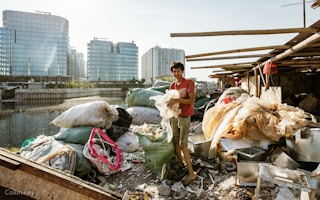Proper management of plastic waste is lacking in coastal communities in Indonesia, the No. 2 contributor to the ocean plastic crisis. That’s the conclusion of a recently published study, which notes that the use of plastic is increasingly outpacing mitigation efforts.
Researchers from Indonesia and Australia found that waste management and infrastructure capacity in coastal communities in Indonesia’s South Sulawesi province was ineffective in stopping plastic debris from polluting the marine ecosystem.
Indonesia is the world’s second-largest plastic polluter, behind only China. Plastic waste in the ocean negatively affects the marine ecosystem as sea creatures like whales, turtles and fish mistake floating plastic waste for food, swallowing material they can’t digest. The plastic accumulates in their bodies over their lifetime, killing them or working their way up the food chain and eventually circling back to humans.
“The crisis facing the world’s oceans from plastics is well documented, yet there is little knowledge of the perspectives and experiences of communities facing overwhelming quantities of plastic waste, most of it originating in other regions,” Anna Phelan, lead author of the new paper and a researcher from the University of Queensland, in a statement.
Results from surveys, interviews and focus group discussions conducted by the paper’s authors with nearly 6,700 households in the province’s Selayar and Wakatobi archipelagic subdistricts showed that knowledge about plastic waste and how to manage it properly was relatively low, while the use of plastic was on the rise with the greater availability and consumption of single-use plastic packaging.
“
The crisis facing the world’s oceans from plastics is well documented, yet there is little knowledge of the perspectives and experiences of communities facing overwhelming quantities of plastic waste, most of it originating in other regions.
Anna Phelan, researcher, University of Queensland
Besides the increased availability of processed packaged foods, the villagers identified other activities that contribute to ocean plastic waste, including boat travel, fishing, seaweed farming, and seasonal monsoons that bring large volumes of additional plastic marine debris.
But even if plastic literacy were higher, the researchers say, there would be little these communities could do to manage the waste effectively, given the limited choice of facilities, both on the supply side and in disposal options, to reduce and manage the waste. The nearest recycling facility to Selayar and Wakatobi is in Makassar on the South Sulawesi mainland, located 173 and 273 kilometers (108 and 170 miles) from the respective subdistricts.
Waste in most coastal communities don’t end up in a landfill or anywhere near a recycling facility, the researchers found. In fact, an average 2,000 kilograms (4,400 pounds) of plastic waste per week might leak into the ocean from just a single village. Residents burn their waste or dump it, either directly into the sea or in piles that can be washed away in heavy rains, the researchers found.
Both Selayar and Wakatobi are located within the tropical marine waters of the Pacific Coral Triangle, considered the world’s epicenter for marine biodiversity. The region is home to more than 600 of global coral reef species, and most of the households there are fishing communities.
The spiraling plastic waste problem has coastal communities like those in South Sulawesi trapped “in a perpetual reinforcing loop” and forced to “shoulder the impacts of the ocean plastic crisis,” the paper says.
“In Indonesia alone, there are thousands of similar coastal communities struggling to manage their own household waste, as well as vast quantities of plastic waste brought in on ocean currents,” Phelan said.
The researchers call for greater responsibility on the part of producers — the companies that make plastic packaging and single-use consumables — to help solve the plastic waste problem in coastal communities. Among the measures they can take include boosting the percentage of recyclable content in their products and packaging, and providing post-retail recycling solutions. The paper also suggests a shift toward a circular plastic economy — one on which all plastic produced is eventually recycled, rather than new plastic being produced — as a “greatly needed” solution.
Indonesia produces about 6.8 million tonnes of plastic waste annually, according to a 2017 survey by the Indonesia National Plastic Action Partnership. Only 10 per cent of that waste was recycled in the approximately 1,300 recycling centers operating in the country, while nearly the same amount, about 620,000 tonnes, wound up in the ocean.
Indonesia plans to reduce that figure by 70 per cent by 2025. Beach cleanups are among the popular measures being carried out here. Local governments are also implementing efforts to reduce the consumption of single-use plastics, including outright bans., while the private sector is investing in sustainable alternatives. The national government also plans to make producers take greater responsibility for the waste generated by their products.
“Producers and manufacturers distributing low-cost processed food and single-use products to these communities need to take responsibility to ensure plastic waste does not end up in the ocean,” Phelan said.
“Remote communities simply cannot recycle their way out of this complex global environmental problem.”
This story was published with permission from Mongabay.com.










